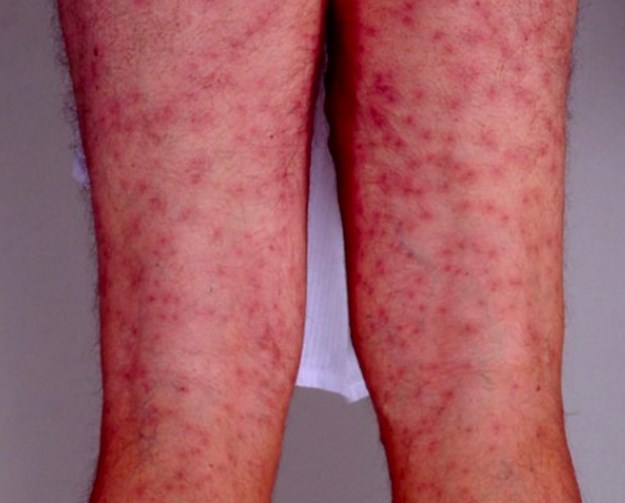
FILE PHOTO
(STEVE ARSTAD / iNFOnews.ca)
July 12, 2024 - 6:00 AM
Lake lovers in Kamloops and the Okanagan are getting swimmers itch and no amount of chamomile lotion and anti-itch cream seems to be bringing relief.
Michelle Russo grew up in Vernon swimming at various beaches and said this is a particularly bad year for the itch.
“It’s earlier in the season for it, there’s more of it and it’s more widespread than what I’ve seen before,” she said. “Somebody mentioned they were getting it from Kal Lake and Kin Beach but I grew up here and never got it from those places.”
Russo’s husband returned from a camping trip in the Outback Resort area on Okanagan Lake a few days ago, and was covered in itchy welts.
“He’s gone out there for years and this is the first time he got swimmers itch," she said. "Nothing really works to take the itch away but we've been putting a paste of baking soda and water on it and he said it kind of helps."
Swimmer’s itch is caused by a tiny worm-like parasite called a schistosome that usually use water snails or birds as a host, according to HealthLinkBC.
The itch comes from the parasites’ larvae which tend to seek shallow water to find a host, including unsuspecting swimmers. Once the larvae are on the swimmer's skin they begin to burrow, but since they can’t survive in humans they die and the dead larvae cause an itchy rash.
The rash isn’t serious on its own, but it can be incredibly irritating, and too much scratching can make things worse leading to infections which could require medical attention. People sometimes feel tingling on their skin when they get out of the water and then small pin sized red spots appear and grow into a rash.
There is no surefire way to completely avoid swimmer’s itch, but there are precautions people can take.
HealthLinkBC advises people to check with local governments, health officers and park representatives about the water condition before swimming to see if swimmer’s itch is common there. One of the most effective ways to avoid swimmer’s itch is to dry off with a towel as soon as you get out of the water and shower as soon as possible to get the larvae off your skin.
Dog owners should be wary of the fact that dogs can get swimmer's itch as well.
Drying off canine companions as soon as they're out of the water helps the same way it helps humans, but if owners suspect their pet has swimmer's itch veterinarians recommend bringing them in for treatment. The parasites don't die off immediately in dogs, and can spread to a dog's digestive tract causing more serious symptoms like vomiting and diarrhea.
READ MORE: Rape survivor wins right in Kamloops court to tell her own story

Swimmer's itch.
Image Credit: Submitted/Mayoclinic.org
Using a pier or dock to avoid the shallowest water helps, as well as avoiding areas with a lot of weed growth because there could be more snails and larvae around aquatic plants.
Swimmer’s itch can’t be passed on from person to person. Kids who are constantly in and out of the water are more likely to get swimmer's itch if they are splashing around shallow water and getting in and out without drying off.
The rash typically appears within 12 hours of infection, the reaction could last two to five days, and symptoms can persist for up to two weeks.
Some helpful tips for those who have swimmer’s itch include using plain calamine lotion, taking antihistamines, taking lukewarm baths with three tablespoons of baking soda, colloidal oatmeal baths and cool compresses. It may be difficult but try to avoid scratching.
People can get more sensitive to the larvae after repeated exposure, so the more times you get swimmer’s itch the worse it could be.
Click here for more information about swimmer's itch.
— With file from Shannon Ainslie.
To contact a reporter for this story, email Jesse Tomas or call 250-488-3065 or email the editor. You can also submit photos, videos or news tips to the newsroom and be entered to win a monthly prize draw.
We welcome your comments and opinions on our stories but play nice. We won't censor or delete comments unless they contain off-topic statements or links, unnecessary vulgarity, false facts, spam or obviously fake profiles. If you have any concerns about what you see in comments, email the editor in the link above. SUBSCRIBE to our awesome newsletter here.
News from © iNFOnews, 2024